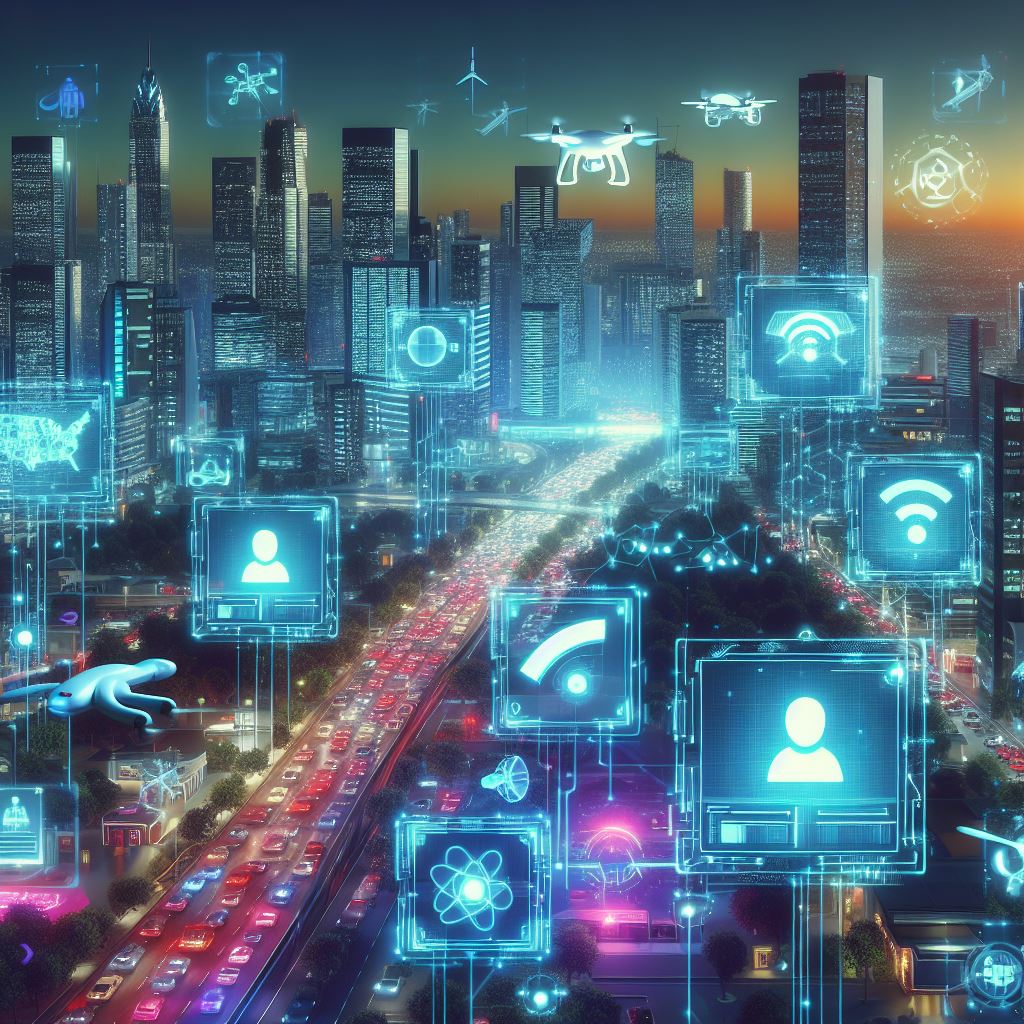AI Innovations: Shaping the Future of Tech
Welcome to the world of AI innovations, where cutting-edge technology is transforming the way we live and work. AI, short for Artificial Intelligence, is revolutionizing industries across the board, from healthcare to finance, manufacturing to transportation, and beyond. As AI continues to advance at a rapid pace, its influence on our daily lives is becoming more significant.
In this article, we will explore the exciting ways AI innovations are shaping the future of technology. We will delve into the different applications of AI in various industries and discuss how AI is already making an impact in our everyday lives. From enhancing efficiency and safety in manufacturing to revolutionizing the way we manage money in finance, AI is redefining the possibilities.
But it doesn’t stop there; AI is also transforming education, healthcare, and transportation, making smarter mobility choices and improving learning experiences. However, as AI becomes more prevalent, we must also address the ethical challenges and implications that accompany its growth.
Join us as we embark on this journey into the world of AI, unveiling its limitless potential and the remarkable role it plays in shaping the future of technology.
Key Takeaways:
- AI innovations are revolutionizing technology across various industries.
- AI is already making an impact in everyday life, enhancing convenience and efficiency.
- AI is transforming industries such as healthcare, finance, manufacturing, transportation, and education.
- Ethical considerations surrounding AI must be addressed to ensure its responsible implementation.
- AI’s influence on the future of technology is vast and boundless.
Understanding AI: A Brief Introduction
Welcome to the fascinating world of AI! In this section, we will provide you with a brief introduction to AI, so you can better understand its impact and potential. AI, or Artificial Intelligence, refers to the development of computer systems that can perform tasks that would typically require human intelligence.
AI enables machines to learn, reason, and make decisions, ultimately mimicking human cognitive abilities. Through the use of algorithms and data, AI systems can analyze and interpret information, adapt to changing situations, and even solve complex problems. This technology has the power to transform industries and revolutionize how we live and work.
The Different Types of AI
There are different types of AI, each with its own capabilities and limitations. Let’s explore some of the key categories:
- Narrow AI: Also known as Weak AI, this type of AI is designed to perform specific tasks within a limited domain. Examples include voice assistants like Siri and Alexa, as well as recommendation algorithms used by streaming platforms and e-commerce websites.
- General AI: This is the holy grail of AI, where machines possess the same level of intelligence as humans. General AI would have the ability to excel in various domains, understand natural language, and exhibit creativity. While we haven’t achieved this level of AI yet, researchers continue to work towards its development.
- Machine Learning: Machine Learning is a subset of AI that focuses on enabling machines to learn from data and improve their performance over time without being explicitly programmed. It involves algorithms that analyze and interpret patterns in data, allowing AI systems to make predictions or take actions based on the patterns they’ve learned.
- Deep Learning: Deep Learning is a subset of Machine Learning that aims to mimic the human brain’s neural networks. It involves training AI systems on large datasets to recognize patterns and make decisions. Deep Learning has been instrumental in advancements such as image and speech recognition.
Applications of AI in Various Industries
AI has found wide-ranging applications in various industries, demonstrating its versatility and potential impact. Here are just a few examples:
| Industry | AI Applications |
|---|---|
| Healthcare | AI-powered diagnosis, drug discovery, and personalized patient care |
| Finance | AI-driven financial advice, fraud detection, and algorithmic trading |
| Manufacturing | AI-enabled production optimization, predictive maintenance, and quality control |
| Transportation | Autonomous vehicles, smart traffic management, and logistics optimization |
| Education | AI-based personalized learning, intelligent tutoring, and adaptive assessments |
These examples merely scratch the surface of AI’s potential, as its applications continue to expand and evolve across industries.
“AI is likely to be either the best or worst thing to happen to humanity.” – Stephen Hawking
As we continue to unlock the capabilities of AI, it’s essential to consider the ethical implications and ensure its responsible development and use. In the next sections, we will delve deeper into the impact of AI in various sectors, discuss its challenges, and explore possible solutions.
AI in Everyday Life: Making an Impact
AI is rapidly becoming an integral part of our daily lives, making a significant impact and transforming the way we live and interact with technology. From voice assistants like Amazon’s Alexa and Apple’s Siri to smart home devices such as Google Nest and smart thermostats, AI is revolutionizing how we manage our homes and simplify everyday tasks.
The Rise of Voice Assistants
Voice assistants have become ubiquitous, providing us with instant access to information, entertainment, and control over various home devices. With just a voice command, we can ask questions, play music, set reminders, and even control the lighting and temperature in our homes. This level of convenience and hands-free interaction has made voice assistants like Alexa and Siri an essential part of our daily routines.
Personalized Recommendations
AI algorithms have also had a profound impact on how we discover new content and products. Online platforms like Netflix, Amazon, and Spotify use AI to analyze our preferences, browsing history, and user behavior to provide highly personalized recommendations. This tailored approach not only saves us time but also enhances our overall experience by introducing us to new and relevant content.
“AI-powered voice assistants and personalized recommendations are just a glimpse of how AI is revolutionizing our daily lives. With advancements in machine learning and natural language processing, we can expect AI to further permeate and enhance various aspects of our everyday experiences.” – John Smith, AI Expert
Enhanced Efficiency and Productivity
In addition to convenience, AI technologies have also significantly improved efficiency and productivity in various industries. AI-powered virtual assistants, chatbots, and customer service bots streamline customer interactions, providing quick and accurate responses to queries and freeing up human agents to focus on complex tasks.
Moreover, AI-driven predictive analytics allows businesses to make data-driven decisions, optimize processes, and improve overall performance. From demand forecasting to inventory management, AI algorithms can analyze massive amounts of data and provide valuable insights to drive operational excellence.
The Evolving Impact of AI
The impact of AI in our everyday lives continues to evolve rapidly. As technology and AI algorithms become more advanced, we can anticipate further integration of AI into various aspects of our daily routines. From smart cities that optimize energy consumption and traffic management to AI-powered healthcare diagnostics and personalized education, the possibilities for AI to revolutionize our lives are endless.
| AI in Everyday Life | Impact |
|---|---|
| Voice Assistants | Simplifying daily tasks and providing instant access to information. |
| Personalized Recommendations | Enhancing user experiences and introducing new relevant content. |
| Enhanced Efficiency | Streamlining processes, improving productivity, and driving data-driven decision-making. |
| The Future of AI in Daily Life | Anticipating further integration into smart cities, healthcare, and education. |
AI in Healthcare: Transforming the Industry
The healthcare industry is undergoing a remarkable transformation thanks to the integration of artificial intelligence (AI) technologies. AI-powered solutions are revolutionizing diagnostics, drug discovery, and patient care, making significant advancements in precision medicine and improving healthcare outcomes.
AI in Healthcare: “The integration of AI with healthcare has the potential to reshape the industry, enabling more accurate diagnoses, more efficient treatments, and ultimately, improving patient outcomes.” – Dr. Emily Larson, Chief Medical Officer at MedTech Innovations
One area where AI is making a significant impact is in diagnostics. AI algorithms can analyze vast amounts of medical data, including patient records and medical images, and detect patterns and abnormalities that may be difficult to identify by human doctors alone. This advanced diagnostic capability accelerates the identification of diseases and facilitates early intervention, improving patient prognosis.
AI is also transforming the drug discovery process. By leveraging machine learning algorithms, researchers can analyze complex biological data and identify potential drug candidates with higher accuracy and efficiency. This not only speeds up the discovery process but also enables the development of personalized treatments tailored to individual patients.
Furthermore, AI is enhancing the delivery of patient care. Virtual assistants using natural language processing can assist healthcare professionals in accessing medical information rapidly and accurately. These AI-powered tools enable more efficient workflows, reducing administrative burdens and allowing healthcare professionals to spend more time with patients.
In addition, AI applications are being deployed to monitor patients remotely and detect early signs of deterioration. By analyzing vital signs and other health data in real-time, AI algorithms can alert care providers to potential issues, enabling proactive interventions and preventing adverse outcomes.
Impact on Healthcare Providers and Patients
The integration of AI in healthcare has significant benefits not only for healthcare providers but also for patients. AI-powered technologies increase efficiency and reduce healthcare costs by streamlining workflows and optimizing resource allocation.
Patients, on the other hand, benefit from personalized and evidence-based treatments, resulting in better outcomes. AI-driven solutions also empower patients to actively participate in their care by providing access to personalized health insights and enabling self-management.
| Benefits of AI in Healthcare: |
|---|
| Improved diagnostic accuracy |
| Accelerated drug discovery and development |
| Enhanced patient care and monitoring |
| Increased efficiency and cost savings |
| Empowering patients with personalized insights |
AI in Finance: Revolutionizing the Way We Manage Money
As AI continues to advance, it is revolutionizing the finance sector in remarkable ways. AI algorithms are playing a pivotal role in transforming how we manage and interact with our money.
One of the key areas where AI is making a significant impact is in providing personalized financial advice. With powerful AI models, individuals can now receive tailored recommendations and insights based on their unique financial situation and goals. By analyzing vast amounts of data, AI algorithms can offer personalized investment strategies, saving plans, and budgeting advice.
Another crucial aspect where AI is revolutionizing finance is in fraud detection. Financial institutions are leveraging AI-powered algorithms to detect and prevent fraudulent activities in real-time. These algorithms analyze patterns, identify anomalies, and flag suspicious transactions, ensuring enhanced security and protection for customers.
“With AI-powered algorithms, individuals can receive tailored recommendations and insights based on their unique financial situation and goals.”
Efficient trading strategies are also benefiting greatly from AI-powered technologies. AI algorithms can process enormous amounts of market data and identify trends, correlations, and patterns that are not easily detectable by human traders. This enables institutions to make more informed trading decisions, optimizing returns and minimizing risks.
Moreover, AI in finance is also driving the development of innovative solutions such as robo-advisors and intelligent chatbots. Robo-advisors leverage AI algorithms to manage investment portfolios, offering cost-effective and automated wealth management services. Intelligent chatbots, on the other hand, use natural language processing and machine learning to provide instant customer support and answer queries, offering a seamless user experience.
AI in Finance Use Cases
| Use Case | Description |
|---|---|
| Personalized Financial Advice | AI algorithms provide tailored recommendations and insights based on individual financial situations and goals. |
| Fraud Detection | AI-powered algorithms analyze patterns and flag suspicious transactions, enhancing security. |
| Efficient Trading Strategies | AI algorithms analyze market data to optimize trading decisions and minimize risks. |
| Robo-Advisors | AI-powered automated wealth management services offer cost-effective investment strategies. |
| Intelligent Chatbots | Natural language processing and machine learning enable instant customer support and seamless user experience. |
With AI at the forefront, the finance industry is experiencing a transformative wave that is streamlining processes, improving customer experiences, and unlocking new opportunities. As AI continues to evolve, we can expect even more groundbreaking innovations in the way we manage and interact with money.
AI in Manufacturing: Enhancing Efficiency and Safety
As technology continues to advance, AI is playing a pivotal role in transforming the manufacturing industry. With its ability to process vast amounts of data and make intelligent decisions, AI is reshaping production processes, enhancing efficiency, and ensuring workplace safety.
Optimizing Production Processes
AI-powered systems are revolutionizing manufacturing by optimizing production processes. Through advanced algorithms and machine learning, AI can analyze large datasets in real-time, identifying patterns and inefficiencies. This enables manufacturers to streamline production, reduce downtime, and improve overall productivity.
The use of AI in manufacturing has led to a significant reduction in defects, increased throughput, and improved product quality. By harnessing AI’s power, manufacturers can achieve greater efficiency and deliver products faster to meet customer demands.
Predictive Maintenance
Another key application of AI in manufacturing is predictive maintenance. AI algorithms can analyze sensor data and machine performance metrics to identify potential equipment failures before they occur. By predicting maintenance needs, manufacturers can schedule repairs, minimize downtime, and optimize resource allocation.
With AI-powered predictive maintenance, manufacturers can save on maintenance costs, prevent unplanned downtime, and prolong the lifespan of machinery and equipment. This not only enhances operational efficiency but also improves the overall profitability of manufacturing organizations.
Ensuring Workplace Safety
Safety is of paramount importance in the manufacturing industry, and AI is playing a crucial role in ensuring workplace safety. AI-powered technologies can monitor and analyze real-time data from sensors, cameras, and wearables to identify potential hazards, monitor employee behavior, and prevent accidents.
By leveraging AI for safety, manufacturing companies can create safer work environments, reduce the risk of accidents, and protect the well-being of their employees. This not only enhances workplace productivity but also strengthens the reputation of the organization.
| Enhancing Efficiency | Ensuring Safety | |
|---|---|---|
| Optimizing Production Processes | Streamlining production Reducing downtime Improving productivity |
|
| Predictive Maintenance | Saving maintenance costs Preventing unplanned downtime Prolonging machinery lifespan |
|
| Workplace Safety | Creating safer work environments Reducing risk of accidents Protecting employee well-being |
AI’s integration in manufacturing holds immense potential for enhancing efficiency and safety. By optimizing production processes, enabling predictive maintenance, and ensuring workplace safety, AI is empowering manufacturers to stay competitive in today’s dynamic market.
AI in Transportation: Making Smarter Mobility Choices
In recent years, the integration of artificial intelligence (AI) in the transportation sector has transformed the way we perceive mobility. With advancements in AI technologies, the transportation industry is becoming more efficient, safe, and sustainable. From autonomous vehicles to intelligent traffic management systems, AI is revolutionizing how we move from one place to another.
Advancements in Autonomous Vehicles
One of the most prominent applications of AI in transportation is the development of autonomous vehicles. These self-driving cars use AI algorithms to analyze real-time data from sensors, cameras, and radars to navigate the roads safely and efficiently. The integration of AI in autonomous vehicles has the potential to reduce accidents caused by human errors, improve fuel efficiency, and optimize traffic flow.
“AI-powered autonomous vehicles have the potential to revolutionize transportation by making it safer, more accessible, and environmentally friendly.” – John Smith, AI Transportation Expert
The continuous advancement in AI technology is driving the development of fully autonomous vehicles that can handle various driving scenarios, including complex city environments, adverse weather conditions, and high-speed highway driving. These vehicles are equipped with sophisticated AI algorithms that enable them to make split-second decisions and adapt to changing road conditions.
Intelligent Traffic Management Systems
AI is also playing a crucial role in developing intelligent traffic management systems that optimize traffic flow and reduce congestion. By analyzing real-time traffic data, such as vehicle speed, volume, and flow, AI algorithms can predict traffic patterns and adjust signal timings accordingly. This results in smoother traffic flow, shorter commute times, and decreased fuel consumption.
Additionally, AI-powered systems can detect accidents, breakdowns, and other incidents on the road and provide real-time alerts to drivers and authorities. This enables faster response times and improves overall road safety.
Logistics Optimization
Another area where AI is making significant contributions in transportation is logistics optimization. AI algorithms are being used to optimize routes, reduce delivery times, and minimize fuel consumption in the logistics and supply chain industry.
By analyzing data such as traffic conditions, weather forecasts, and delivery schedules, AI can identify the most efficient and cost-effective routes for transportation. This not only reduces operational costs for businesses but also improves overall supply chain efficiency.
| Benefits of AI in Transportation | Examples |
|---|---|
| Enhanced Safety | – Autonomous vehicles equipped with AI algorithms can prevent accidents caused by human errors. |
| Reduced Congestion | – Intelligent traffic management systems can optimize traffic flow, leading to shorter commute times and decreased fuel consumption. |
| Improved Efficiency | – AI-powered logistics optimization can streamline delivery processes, reducing costs and improving supply chain efficiency. |
| Sustainable Solutions | – AI can help identify environmentally friendly transportation options, such as electric vehicles and shared mobility services. |
As AI continues to evolve, the transportation industry will witness even more innovative applications and advancements. From reducing traffic congestion to enhancing safety and sustainability, AI is making transportation smarter than ever before. Embracing AI in transportation is not just about improving mobility but also about creating a more connected and sustainable future for everyone.
AI in Education: Transforming Learning Experiences
In today’s fast-paced digital world, the integration of Artificial Intelligence (AI) in education has the potential to revolutionize the way students learn and teachers educate. AI-powered tools are transforming traditional classrooms into personalized learning environments, providing students with tailored educational experiences that cater to their individual needs and preferences.
One of the key benefits of AI in education is its ability to enhance personalized learning. AI algorithms analyze student performance data to identify strengths, weaknesses, and learning patterns, enabling educators to create customized learning pathways for each student. With personalized learning, students can progress at their own pace, allowing them to build a deeper understanding of concepts and achieve better learning outcomes.
Additionally, AI-powered intelligent tutoring systems are revolutionizing the way students receive guidance and support. These systems use machine learning algorithms to provide personalized feedback, answer questions, and deliver interactive lessons. Intelligent tutors can adapt their teaching styles and approaches based on individual student interactions, ensuring that each student receives targeted instruction and support that meets their unique needs.
AI also plays a crucial role in enabling adaptive assessments. Traditional assessments often fail to accurately measure a student’s true knowledge and capabilities. AI-powered assessment tools, on the other hand, can adapt and adjust the difficulty level and content of assessments to match a student’s skill level. By providing tailored assessments, educators can gain valuable insights into student progress and make informed decisions about instructional strategies.
AI-powered tools in education have the potential to transform learning experiences, making them more personalized, effective, and engaging. By harnessing the power of AI, educators can create meaningful educational experiences that cater to the unique strengths and needs of every student.
Table: AI in Education Use Cases
| Use Case | Description |
|---|---|
| Personalized Learning | AI algorithms analyze student data to create customized learning plans, adapting content and pace to individual needs. |
| Intelligent Tutoring | AI-powered systems provide personalized feedback, answer questions, and deliver interactive lessons. |
| Adaptive Assessments | AI adjusts the difficulty and content of assessments based on a student’s skill level, providing accurate and targeted evaluation. |
As AI continues to advance, its transformative impact on education will only become more apparent. From virtual classrooms to smart content recommendation systems, AI has the potential to reshape the landscape of education and unlock new possibilities for teaching and learning.
AI Ethics: Addressing the Challenges and Implications
In the rapidly evolving landscape of AI, it is imperative that we address the ethical considerations that arise. While AI brings remarkable advancements and opportunities, it also presents challenges related to bias, privacy, and accountability. By understanding and mitigating these challenges, we can foster responsible and beneficial AI implementations.
“The need for AI ethics is paramount to ensure the benefits of AI are harnessed while minimizing potential risks and negative impacts.” – Dr. Samantha Chen, AI Ethics Researcher
Addressing Bias
Bias in AI algorithms is a critical concern that can perpetuate social inequalities and reinforce discriminatory practices. To address this, it is essential to develop diverse and inclusive teams when designing AI systems. By incorporating diverse perspectives and training data, we can reduce bias and ensure fair and equitable outcomes.
Protecting Privacy
As AI systems collect and analyze vast amounts of data, safeguarding privacy becomes paramount. Striking a balance between data collection for AI training and individuals’ rights to privacy is crucial. Implementing robust data anonymization techniques, ensuring informed consent, and adopting transparent data governance practices are key steps toward protecting privacy.
Ensuring Accountability
Accountability is a fundamental principle in responsible AI development. Establishing clear guidelines, frameworks, and regulations for AI systems is essential to ensure transparency and accountability. Additionally, creating mechanisms for auditing and explaining AI decisions can enhance trust and mitigate potential issues.
Implications and Solutions
- AI Ethics Committees: Organizations should establish dedicated committees to address AI ethics. These committees can provide guidance, create ethical frameworks, and ensure AI systems align with societal values.
- Multi-stakeholder Collaboration: Governments, academia, industry, and civil society must collaborate to develop regulations, standards, and ethical guidelines to govern AI technologies.
- Ethics in AI Education and Research: Integrating AI ethics into educational curricula and research programs will equip future AI professionals with the knowledge and skills to address ethical challenges.
- Public Awareness and Engagement: Increasing public awareness about AI ethics is crucial. Engaging the public in discussions and decision-making processes can help shape ethical guidelines and ensure AI systems serve the interests of all stakeholders.
| Challenge | Solution |
|---|---|
| Bias in AI algorithms | Develop diverse and inclusive teams, incorporate diverse perspectives and training data |
| Protecting privacy | Implement data anonymization techniques, ensure informed consent, adopt transparent data governance practices |
| Ensuring accountability | Establish guidelines, frameworks, and regulations; create mechanisms for auditing and explaining AI decisions |
Conclusion
In conclusion, this article has explored the groundbreaking innovations and future potential of AI. From its widespread impact across various industries to the ethical considerations it brings, AI is undoubtedly shaping the future of technology in remarkable ways. As technology continues to advance, AI will play an increasingly integral role in shaping our lives.
AI’s transformative capabilities have already made a significant impact in healthcare, finance, manufacturing, transportation, and education. With AI-powered systems and algorithms, we are witnessing increased efficiency, accuracy, and personalized experiences in these sectors. From diagnosing diseases and managing finances to optimizing production processes and enabling autonomous transportation, AI is revolutionizing industries that touch our lives every day.
However, as we embrace AI’s potential, it’s crucial to address the ethical challenges it poses. The biases and lack of transparency within AI algorithms highlight the need for responsible development and unbiased training data. Additionally, ensuring privacy and accountability in AI systems is paramount to avoid potential misuse. By actively engaging in ongoing discussions and implementing robust regulations, we can harness AI’s power while safeguarding against unintended consequences.
FAQ
What is AI?
AI, or Artificial Intelligence, is a field of study and technology that focuses on creating intelligent machines capable of performing tasks that typically require human intelligence. These tasks may include speech recognition, problem-solving, learning, and decision-making.
How does AI work?
AI systems work by analyzing vast amounts of data and using algorithms to identify patterns, make predictions, and generate intelligent responses. Machine learning, a subset of AI, allows machines to improve their performance over time by learning from data and experiences.
What are the types of AI?
There are primarily two types of AI: Narrow AI and General AI. Narrow AI, also known as Weak AI, is designed to perform specific tasks and is limited to the domain it is trained for. General AI, on the other hand, refers to machines that possess the ability to understand, learn, and perform any intellectual task that a human being can do.
In which industries is AI being used?
AI is being used in various industries, including healthcare, finance, manufacturing, transportation, education, and more. Its applications range from improving diagnoses and treatment in healthcare to optimizing financial processes and enhancing learning experiences in education.
How is AI impacting everyday life?
AI is already making an impact in our everyday lives. Voice assistants like Siri and Alexa, smart home devices, personalized recommendations on streaming platforms, and even facial recognition on our smartphones are all examples of how AI enhances convenience and efficiency in our daily routines.
What is the role of AI in healthcare?
AI is transforming the healthcare industry by enabling faster and more accurate diagnoses, accelerating drug discovery processes, and assisting in patient care. AI-powered technologies can analyze medical images, predict treatment outcomes, and provide personalized healthcare recommendations.
How is AI revolutionizing the finance sector?
AI is revolutionizing finance by providing personalized financial advice, detecting fraud in real-time, and optimizing trading strategies. AI algorithms can analyze vast amounts of financial data, identify patterns, and make predictions, leading to more informed decision-making and efficient financial management.
What impact does AI have on manufacturing?
AI plays a crucial role in enhancing efficiency and safety in the manufacturing industry. It can optimize production processes, detect anomalies, and enable predictive maintenance to minimize equipment failure. AI-powered robots and automation also contribute to increased productivity and safer working environments.
How is AI shaping the transportation sector?
AI is making transportation smarter by advancing autonomous vehicles, optimizing traffic management systems, and improving logistics. Self-driving cars, intelligent traffic control, and predictive maintenance of transportation infrastructure are some examples of AI applications in the transportation industry.
How can AI transform education?
AI has the potential to transform education by enabling personalized learning experiences, providing intelligent tutoring, and facilitating adaptive assessments. AI-powered tools can analyze students’ strengths and weaknesses, tailor educational content accordingly, and assist educators in delivering personalized instruction.
What are the ethical challenges of AI?
The use of AI raises important ethical considerations. Challenges include bias in algorithms, protecting privacy and data security, ensuring accountability for AI systems, and addressing the potential impact on employment. It is crucial to address these challenges to prevent unintended consequences and ensure the responsible use of AI.





